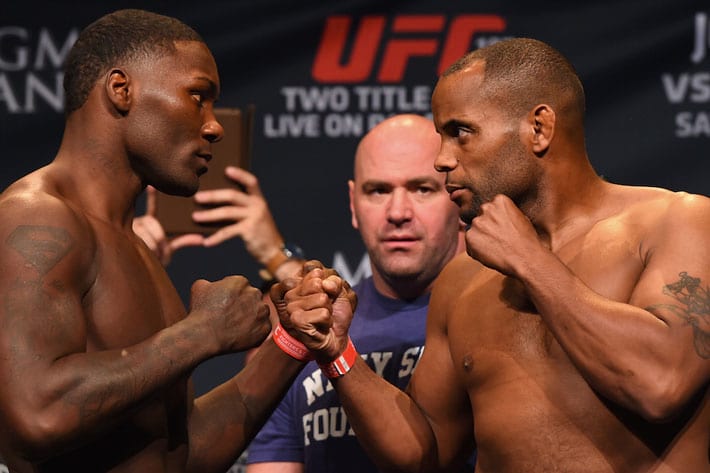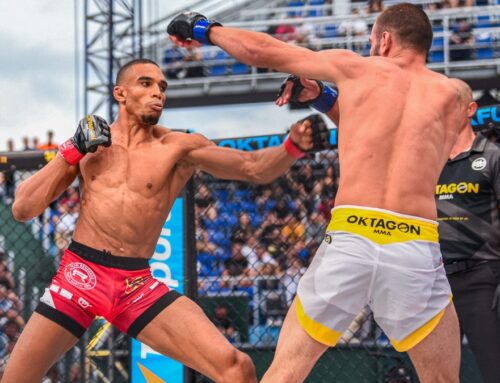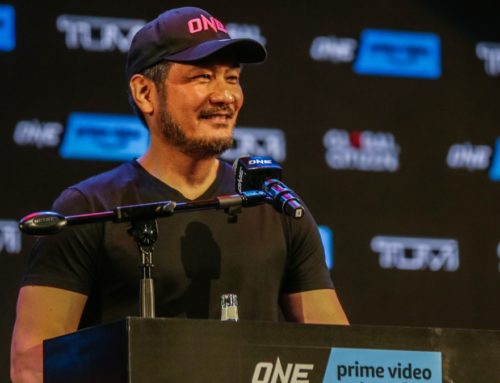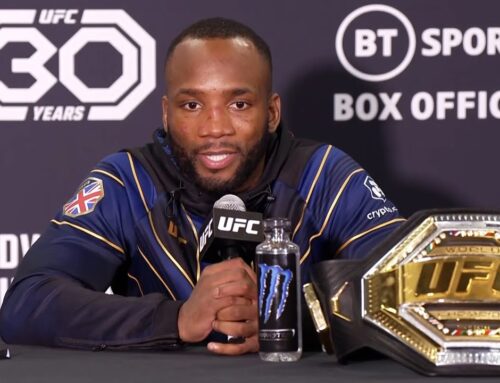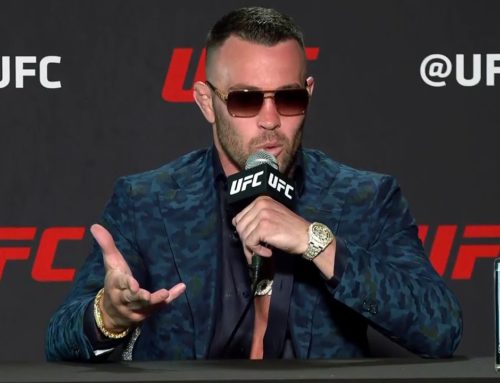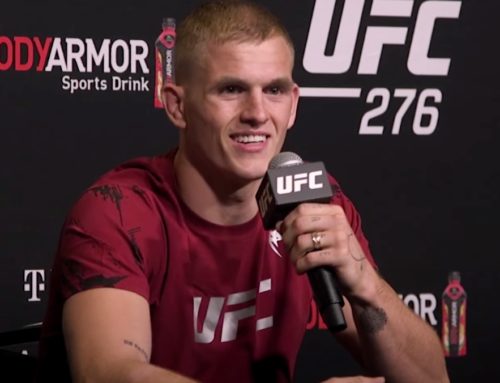By Elliot Worsell:
Two years ago, at UFC 187, Anthony ‘Rumble’ Johnson cracked the chin of Daniel Cormier with a right hand in round one that sent the Louisiana-native across the Octagon and hurtling towards the deck, and it’s that right hand, and the momentary mayhem it triggered, which provides the main point of intrigue ahead of the pair’s second UFC light-heavyweight title fight this Saturday (April 8) at UFC 210 in Buffalo, New York.
In truth, had it not been for that overhand right, Johnson’s single success in the bout, this rematch would rouse little in the way of interest. After all, Cormier, woken by the haymaker to his jaw, submitted Johnson two rounds later, in the third, and rag-dolled him from near enough the moment the aforementioned right hand landed to the moment the challenger tapped.
But that was then and this is now and Johnson, the ever-expanding one-time welterweight, has won three fights since and defeated the likes of Jimi Manuwa, Ryan Bader and Glover Teixeira. What’s more, he has claimed those scalps the Anthony Johnson way, which is to say by cutting through each contender within the scheduled distance and in typically violent fashion. Teixeira, the last to fall at the feet of ‘Rumble’, was cold-cocked by an uppercut after just 13 seconds of the first round; in total, Johnson has landed this rematch with Cormier off the back of just seven minutes and seven seconds of cage time, a startling statistic that shines a light not only on the dearth of challengers out there but also the speed at which Johnson is able to do damage; indeed, there is perhaps no deadlier first-round fighter on the planet.
Cynics will argue, however, that Johnson’s strengths today are the same as they were in 2015. They will say Johnson still possesses the power to hurt, stun and possibly even stop Cormier early; that he is still explosive and dangerous for every moment he’s upright; that he is still, in Cormier’s words, a serious threat for seven minutes. So what’s new? We were privy to this information two years ago.
“When we talk about him being a completely different fighter, I don’t necessarily know what you guys are basing this on,” Cormier said during last week’s UFC 210’s media conference call. “He beat Jimi Manuwa and he took him down, but of course he’s going to take Jimi Manuwa down. He’s a wrestler. Jimi Manuwa can’t wrestle. Then you’re talking about him and Ryan Bader. If I would’ve shot on Anthony from across the Octagon, he would’ve done the same thing to me. He fought for a total of seven minutes since him and I fought, but he’s this completely different fighter? I have no idea where you guys are getting this from.”
For Johnson, it’s not just about the quickness of his post-Cormier success. There’s more to it than that. Cormier’s right: rate of improvement cannot be assessed on a mere seven minutes and seven seconds of Octagon work. It’s the stuff that goes on behind closed doors that Johnson feels has made a difference in him and will therefore make all the difference on April 8. He’ll point to the work he has done with Neil Melanson, for example, the renowned grappling coach brought onboard after the first Cormier fight, as being indicative of a fighter aware of his flaws and keen to minimise them.
“I’m definitely not the same fighter I was two years ago,” Johnson said. “Every day, every week, every month, every year I’m getting better and better, so you’ll see a different guy out there the next time you see me fight.
“The loss definitely lit a fire under my ass to train harder and I know what I need to do to beat this guy.”
Nobody doubts the knowledge Johnson will have gleaned from fight number one. If he isn’t able to see why he lost the first Cormier fight – when fired up by early success, when on the brink, he thought, of finishing the fight, only to be kneaded like dough for two-and-a-half-rounds – there’s little hope. He wouldn’t have needed two years to work out what went wrong. It would have taken him less than two minutes.
But it’s one thing realising the mistakes of the past and another thing being able to rectify them. Furthermore, though Johnson, at 33, is not beyond the age of improving, his is a style which hardly lends itself to refining, much less an overhaul of the kind he’d probably need in order to flourish against Cormier for any longer than five minutes. There’s a disparity in their striking skills, just as there is in their wrestling skills, but there’s a far greater disparity in the latter than there is the former. And Johnson knows this just as Cormier knows this.
“The majority of the (MMA) community believes I’m just a first-round fighter because most of my fights end in the first round,” Johnson said. “But they’re entitled to their opinion, and that’s fine with me. I have nothing to prove to anybody but myself.”
As is the case with the majority of Anthony Johnson fights, there’s an inevitability to the first round on Saturday night that makes it must-watch for us and dangerous for Daniel Cormier. We know he will start fast. He has no choice but to start fast. We also know it serves him well to capitalise on the moment; meaning, when the two are upright, when he’s relatively fresh, when his sizeable muscles have yet to be starved of oxygen and ransacked by lactic acid. But, equally, the surprise element of Johnson’s blitzkrieg is somewhat diluted this time around, one, because Daniel Cormier, a part-time UFC commentator, possesses one of the most impressive analytical minds in the game and, two, because he has seen it all before.
Moreover, there’s a sense Cormier has grown into his role as UFC light-heavyweight champion. Gone is the feeling he is there by default or merely keeping the seat warm for someone else. He believes it now. Feels he belongs. Feels dominant. The evidence is there, too: Johnson, the man many perceive to be the next best active 205-pound fighter in the world, was handled by Cormier with relative ease and DC followed that with a successful title defence against Alexander Gustafsson and a late-notice, non-title job against Anderson Silva at UFC 200; the enigmatic Jon Jones, he of former UFC glories and latterly an orange jumpsuit, is still the only man to conquer Cormier.
Cormier might not shock and shine like Johnson – boos soundtracked his UFC 200 stinker with Silva – but he’s as consistent and dependable as anyone in MMA right now. There’s a solidity to the 38-year-old from Lafayette. Solid frame, solid foundations, solid game plan, solid bet. It’s what makes Johnson’s task on Saturday night so difficult.
Knowledge, they say, is power. Yet the knowledge Johnson, the most powerful man at 205-pounds, extracted from the events of May 23, 2015 – the night he last tasted defeat – pales in comparison to the knowledge Cormier possessed before that date, after that date and today, just days from fight number two.

